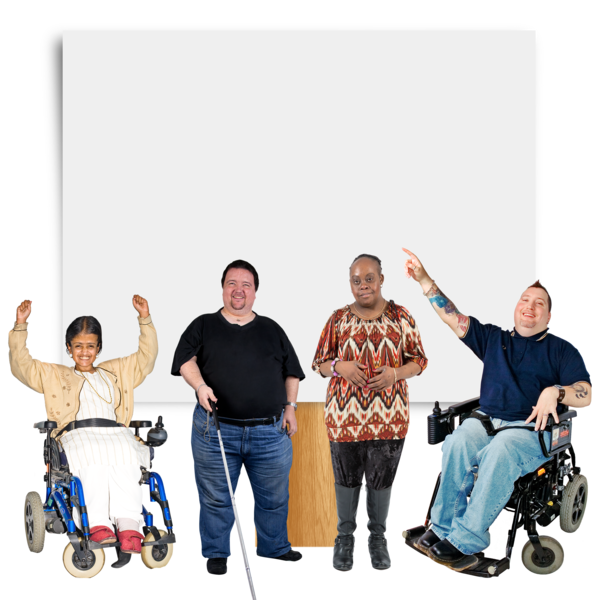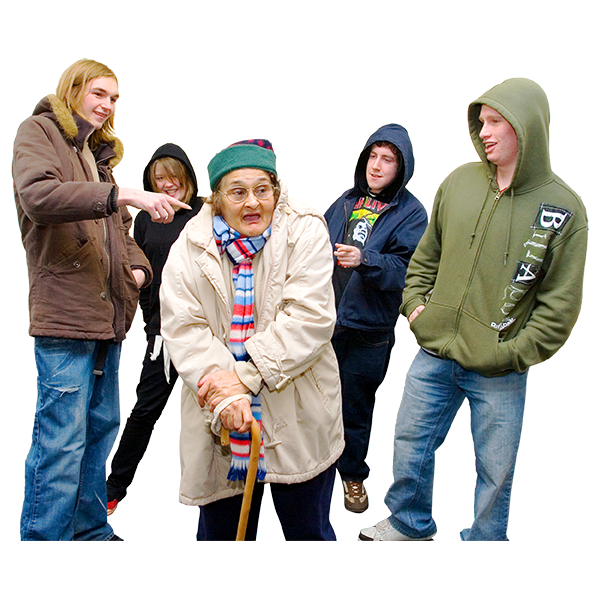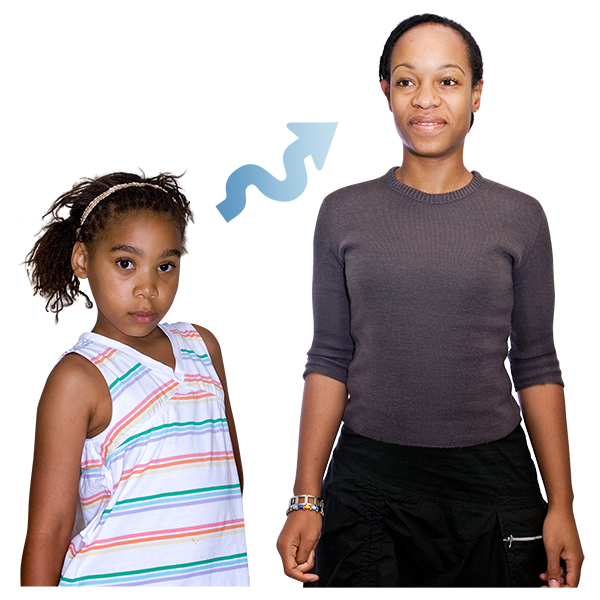People with a
learning disability
 A learning disability is to do with the way someone's brain works. It makes it harder for someone to learn, understand or do things.
face severe health inequalities throughout their life – which can begin even before birth.
A learning disability is to do with the way someone's brain works. It makes it harder for someone to learn, understand or do things.
face severe health inequalities throughout their life – which can begin even before birth.
A new
survey
 A survey is when someone asks you to answer some questions.
from Mencap – which gathered responses from 116 families of children with a learning disability aged between 0-5 years - found only 31% of parents or carers said they received the right type and amount of information from the hospital care team in the weeks and months following their child being diagnosed as having a learning disability.[i]
A survey is when someone asks you to answer some questions.
from Mencap – which gathered responses from 116 families of children with a learning disability aged between 0-5 years - found only 31% of parents or carers said they received the right type and amount of information from the hospital care team in the weeks and months following their child being diagnosed as having a learning disability.[i]
With a current storyline on ITV soap opera Emmerdale also highlighting this issue – Mencap today launches its new Children’s
Campaign
 A campaign is when people work together to try to change something.
to create better health outcomes for children with a learning disability from the point of diagnosis and beyond.
A campaign is when people work together to try to change something.
to create better health outcomes for children with a learning disability from the point of diagnosis and beyond.
As part of this campaign, the charity is calling on hospitals to create a 'Disability Coordinator' role within their hospital trust to ensure a vital link between the hospital and the support available from services and groups in the
community
 A community is the people and places in an area.
. This role would support and signpost families of children with a learning disability to get the support they need, from pregnancy and throughout childhood.
A community is the people and places in an area.
. This role would support and signpost families of children with a learning disability to get the support they need, from pregnancy and throughout childhood.
The Emmerdale storyline – being broadcast this month on ITV - shows a couple who, without the right level of support, are left to process a huge amount of information and make a decision whether to terminate their pregnancy following a pre-natal diagnosis that their baby has Down’s syndrome.
Having access to the right specialist support and health information, communicated in an appropriate way, is fundamental to achieving the best outcomes for the whole family – yet too often this doesn’t happen. The health and wellbeing of people with a learning disability, and closing health inequalities, must start in childhood at the point of diagnosis.
New survey results reveal the vital need for support
Following Mencap’s survey, which found only 31% of parents or carers said they received the right type and amount of information from the hospital care team in the weeks and months following their child being diagnosed as having a learning disability, it’s clear how much more needs to be done.[ii]
“There was no support after finding out our unborn baby had Down’s syndrome. All the time we were offered abortions.” Mencap Early Years Survey, 2020
Many said their experience of diagnosis was negative, confusing and traumatic. It is of deep concern that nearly half (45%) reported they had experienced negativity, prejudice or
discrimination
 Discrimination is when someone is treated differently (usually in a bad way) because of things like their disability or their
religion
Discrimination is when someone is treated differently (usually in a bad way) because of things like their disability or their
religion
 Religion is to do with the things you believe about the world. For example you may believe there is a god or something else. Examples of religions are Christianity, Hinduism, Islam and Judaism.
.
from healthcare professionals either deliberately or non-deliberately.[iii]
Religion is to do with the things you believe about the world. For example you may believe there is a god or something else. Examples of religions are Christianity, Hinduism, Islam and Judaism.
.
from healthcare professionals either deliberately or non-deliberately.[iii]
“For parents that are expecting a child with a diagnosis of Down’s syndrome they really need to look at the way they deliver the news and care post diagnosis to support parents through the pregnancy.” Mencap Early Years Survey, 2020
“I would have liked to have pointed in the direction of where I could get relevant info, instead of relying on Google.” Mencap Early Years Survey, 2020
“I would have liked more balanced information about Down’s syndrome and lived experience of what it’s like living with the condition in 2020.” Mencap Early Years Survey, 2020
Providing crucial support through a Disability Coordinator
To ensure families get the support they need Mencap is calling for a Disability Coordinator role to provide support from the point a child is diagnosed as having a learning disability. A coordinator would play an important role in equipping families with the information, advice and support they need throughout their child’s life – both within the hospital and in the community.
The role would signpost families towards sources of information and advice about learning disability, based on lived experience; help to develop care pathways by notifying external agencies and involving the family in decision-making; and offer support, for example, through peer support groups.
“She’s 4 and I only found out about the learning disabilities team last week.” Mencap Early Years Survey 2020
“We were given some booklets and sent on our way.” Mencap Early Years Survey, 2020
Disability Coordinators could also play a vital role in shaping support and services in the area by working with local authorities and health bodies around local commissioning arrangements, and support other hospital staff to ensure best practice in relation to diagnosis and support for people with a learning disability and their families is spread across the whole hospital.
The role would also be key to supporting young people with a learning disability as they
transition
 Transition means changing from one thing to another. Transition sometimes means things like when you change from having children's social care to adult social care.
from children to adult services – something that could set the groundwork for better healthcare for children with a learning disability throughout their life.
Transition means changing from one thing to another. Transition sometimes means things like when you change from having children's social care to adult social care.
from children to adult services – something that could set the groundwork for better healthcare for children with a learning disability throughout their life.
Mencap launches new resources to support parents and healthcare professionals
With the launch of its Children’s Campaign – part of Mencap’s long-running Treat Me Well campaign which aims to transform healthcare for people with a learning disability – the charity is also launching resources for both parents and healthcare professionals at the point of diagnosis.
Resources aimed at parents of children with a learning disability provide information and
guidance
 Guidance means being given clear instructions to be able to do something well.
, focusing on informing parents about the support and services available from healthcare professionals.
Guidance means being given clear instructions to be able to do something well.
, focusing on informing parents about the support and services available from healthcare professionals.
For healthcare professionals, the resources focus on the vital role they play when a family receive a diagnosis. Concentrating on the importance of communication and what support should be available, the resource aims to inform and convey the key knowledge healthcare professionals need to provide the best possible for care for families.
Edel Harris, Chief Executive of the learning disability charity Mencap, said:
“Parents can often find out that their child has a learning disability at a hospital appointment - whether a pre-natal diagnosis or shortly after birth. Hospitals have a vital role to play in providing information and advice - not only about health services but also signposting to the other support available such as support for early years development and access to social services. Families are often left to discover and navigate a complex maze of services on their own at a time when they need support the most, leaving a vital period when needs are unmet and may escalate.
“Many families experience serious anxiety pre-birth, through a lack of appropriate information and support at the point they receive a diagnosis. It is crucial that they get the right information, advice and access to support – at both the hospital and in the community – to give their child the best possible start in life.”
To find out more about Mencap’s Children’s Campaign, visit: mencap.org.uk/get-involved/campaign-mencap/treat-me-well/treat-me-well-children
-ENDS-
For further information, contact Mencap’s media team on: media@mencap.org.uk or 020 7696 5414 (including out of hours).
Notes to editors
[i] Mencap Early Years Survey (2020). Mencap ran a survey with 116 parents or carers of a child with a learning disability aged between 0-5 years. The survey ran from 28th September 2020 to 21st October 2020 and was hosted on Survey Monkey.
[ii] Mencap Early Years Survey (2020).
[iii] Mencap Early Years Survey (2020).
About Mencap
There are 1.5 million people with a learning disability in the UK. Mencap works to support people with a learning disability, their families and carers by fighting to change laws, improve services and access to
education
 Education is when you learn things. When you fill in a form to get a job, education means you write where you went to school, college or university.
,
employment
Education is when you learn things. When you fill in a form to get a job, education means you write where you went to school, college or university.
,
employment
 Employment means having a job.
and
leisure
Employment means having a job.
and
leisure
 Leisure is when you have time to do things you enjoy like playing sports or going to the pub.
facilities. Mencap supports thousands of people with a learning disability to live their lives the way they want. Visit www.mencap.org.uk.
Leisure is when you have time to do things you enjoy like playing sports or going to the pub.
facilities. Mencap supports thousands of people with a learning disability to live their lives the way they want. Visit www.mencap.org.uk.
For advice and information about learning disability and Mencap services in your area, contact Mencap’s Learning Disability Helpline on 0808 808 1111 (10am-3pm, Monday-Friday) or email helpline@mencap.org.uk.
Treat me well campaign
In 2018, Mencap launched our Treat Me Well campaign to help save lives and to transform how the NHS treats people with a learning disability in hospital.
It is estimated 1,200 people with a learning disability die avoidably every year when timely access to good quality care could have saved them. While people with a learning disability die on average over two decades younger than people without a learning disability.
Over ten years after Mencap highlighted the issue of people with a learning disability dying avoidably (PDF), Mencap’s Treat me well campaign is working with healthcare professionals and campaigners to change that.
Working alongside healthcare professionals and campaigners like Paula McGowan, mother to Oliver McGowan who died in hospital, the Treat me well campaign has succeeded in securing
mandatory
 Mandatory means that something must be done.
learning disability training for all health professionals which is named in honour of Oliver – The Oliver McGowan Mdantory Training in Learning Disability and
Autism
Mandatory means that something must be done.
learning disability training for all health professionals which is named in honour of Oliver – The Oliver McGowan Mdantory Training in Learning Disability and
Autism
 Autism is a disability. Autistic people find it difficult to understand what other people think and feel. They also find it difficult to tell people what they think and feel. Everyone with autism is different.
- and will be piloted shortly.
Autism is a disability. Autistic people find it difficult to understand what other people think and feel. They also find it difficult to tell people what they think and feel. Everyone with autism is different.
- and will be piloted shortly.
Simple changes in hospital care can make a big difference – better communication, more time and clearer information.
But we know the treatment that people with a learning disability get in hospital is still not good enough in many parts of the country. This has to change.
Our Treat me well campaign is working with healthcare professionals and campaigners to make sure people with a learning disability are treated equally in hospital and get the healthcare they need and have a right to which can help to save lives.
What is a learning disability?
- A learning disability is a reduced intellectual ability which can cause problems with everyday tasks – for example shopping and cooking, or travelling to new places – which affects someone for their whole life
- Learning disability is not a mental illness or a learning difficulty, such as
dyslexia
 Dyslexia is a learning difficulty. People who have dyslexia can find it hard to read, write and spell.
. Very often the term ‘learning difficulty’ is wrongly used interchangeably with ‘learning disability’
Dyslexia is a learning difficulty. People who have dyslexia can find it hard to read, write and spell.
. Very often the term ‘learning difficulty’ is wrongly used interchangeably with ‘learning disability’ - People with a learning disability can take longer to learn new things and may need support to develop new skills, understand difficult information and engage with other people. The level of support someone needs is different with every individual. For example, someone with a severe learning disability might need much more support with daily tasks than someone with a mild learning disability.